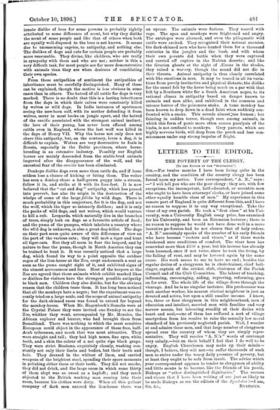LETTERS TO THE EDITOR.
THE POVERTY OF THE CLERGY.
[TO THE EDITOR OF THE "SPECTATOR."] Stu, —For twelve months I have been living quite in the country, and the condition of the country clergy has been forced upon my notice. Your correspondent, "A. N.," says : —" I will tell you who are the poor clergy : they are, with few exceptions, the incompetent, half-educated, or eccentric men who ought to have been attorneys' clerks, or have joined some other equally humble class of men." My experience in this remote part of England is quite different from this, and I have no reason to suppose it in any way exceptional. Take the vicar of my own parish. He took a "first class" at his Uni- versity, won a University English essay prize, has examined for his University, and been an Extension lecturer ; there is no reason to suppose he would not have done well in a more lucrative profession had he not chosen that of holy orders. " A. N." amusingly speaks of the number of his early friends who have become " rectors and vicars," as if these words betokened sure conditions of comfort. The vicar here has somewhat more than £150 a year, but his income has already been lessened, once if not twice, since he took the living, by the falling of rent, and may be lowered again by the same cause. His work seems to me to have no end ; besides the regular duties of a clergyman he is choir-trainer, chief bell- ringer, captain of the cricket club, chairman of the Parish Council and of the Club Committee. The labour of teaching, influencing, encouraging, aiding, reproving, reforming, goes on for ever. The whole life of the village flows through the vicarage. And he is no singular instance. His predecessor was such another worker, his nearest clerical neighbour is just as devoted and active, but upon a still smaller income. I know, too, three or four clergymen in this neighbourhood, men of education and intellect, married men with families and very narrow means, but labouring steadily at their duties with heart and soul,—one of them has suffered a sort of village martyrdom from his resolve to raise the sexually low moral standard of his previously neglected parish. Well, I wonder at and admire these men, and that large number of clergymen spread over the country of whom they are simply repre- sentative. They will receive "A. N.'s " words of contempt very calmly,—but on their behalf I feel that I do well to be angry. English Churchmen may make up their minds— though, I believe, they will not—to suffer thousands of such men to strive under the weary daily pressure of poverty, but at least they ought to be safe from insult. The advice which your correspondent appears to tender to clergymen of ability and little means is to become, like the friends of his youth, Bishops or "other distinguished dignitaries." The rectors and vicars that I have been writing of are just as likely to be made Bishops as are the editors of the Spectator !—I am,


















































 Previous page
Previous page